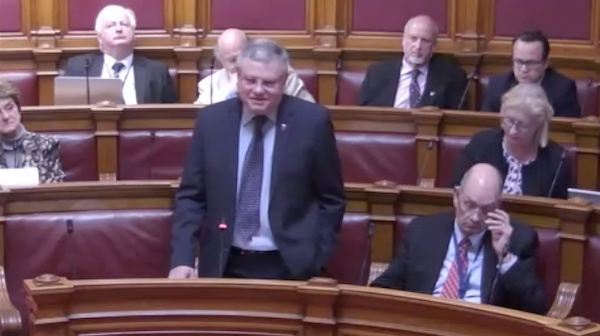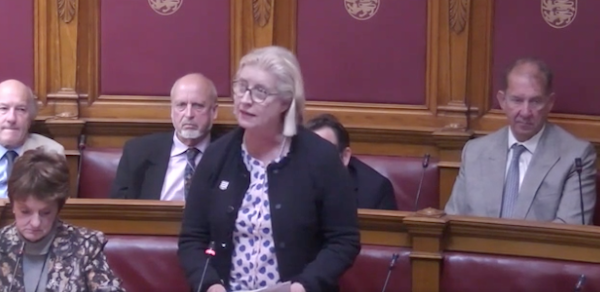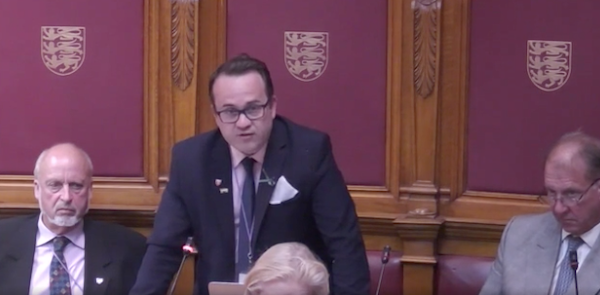

From personal struggles to the loss of loved ones...politicians have opened up about mental health in a series of raw and emotional accounts underlining the urgent need to improve Jersey's services.
While States Assembly meetings are often viewed as a forum to score political points, and debate budgets, population and other policies, yesterday's saw a markedly different approach.
Following the publication of a damning report showing that islanders with mental health problems are not receiving enough support due to chronic under-investment in the service meant to help them, an in-committee debate was held - a roundtable format allowing States Members to openly exchange views without a vote at the end.
Deputy Mary Le Hegarat says #JerseyCI’s #mentalhealth services aren't as good as they should be and that @GovJersey hasn't done enough to improve mental health services #MentalHealthAwareness #StatesAssembly #ScrutinyJSY
— States Assembly (@StatesAssembly) May 22, 2019
Several States members made resounding calls for improvement not only of the services but also of the facilities. Deputy Carina Alves, who sat on the Panel which wrote the report, said that people would be better off in prison than in Orchard House, which she described as “a sad and bleak place” and “a complete disgrace to humanity.”
Deputy Scott Wickenden asked for the government to commit “a pot of money” to mental health services, noting that “money seems to fall out of this government for whatever reason.”
But perhaps most poignant was the number of States Members that rose from their seats in the States Chamber to share stories laying bare their own experiences and struggles with mental health in a series of emotional speeches, aiming to show, "It's ok not to be ok."
These are their stories...

Pictured: Trinity's Deputy said there had been a “total lack of investment" in mental health services.
Deputy Hugh Raymond talked about his father-in-law, a teacher, who spent 12 months in St. Saviour’s Hospital in the late 80s. “I used the phraseology because I can’t remember what the court said - ‘he fell out of the window’ at St. Saviour’s and unfortunately died,” he told the Assembly, adding that locks were then put on the windows at the facility.
The Trinity Deputy became emotional as he explained how his mother-in-law struggled to cope, adding that the help she received was virtually the same as what it is “30-odd years down the line.” “In other words, ‘We’ll speak to you' - but that was it,” he explained.
He called for investment into the mental health facilities, noting there’s been a “total lack of investment.” “It’s not even fallen short,” he noted.

Pictured: Constable Richard Vibert said he first experienced depression when he was a teen.
Constable Richard Vibert talked about his personal experience of depression to show that “in some areas we have not moved forward over the decades.”
He explained that “something in my mind appeared to change” when he was just 14 years old, but that he hid it for many years. This affected his academic career and he didn’t go to university because he felt he would “would be unable to cope with the mental illness I had been hiding for some years” once away from the “protection of being with people I knew."
He told the Assembly he eventually talked to a doctor about his issues around the age of 20. “I was quite depressed by that stage,” he said, adding that he underwent treatment at the Hospital as an outpatient and that it was “so horrific” that he got worse and refused to go through further treatment.
“I always felt like it was never going to come to an end,” Mr Vibert went on to say, adding that he continued to hide his condition over fears it would create issues for his career.

Pictured: Constable Vibert said he had a "horrific" experience while receiving treatment at the hospital.
It wasn’t until the age of 31 - “17 years on” - that he eventually found a treatment that worked for him, one that he still takes to this day. “I’ve had 30 years, although the depression would creep back, of normal life.”
He urged parents, teachers and youth clubs to get training to spot the signs of mental illness. “The earlier you catch those things the better,” he concluded.

Pictured: "The community spirit really does help," Karen Shenton-Stone told the Assembly.
Constable Karen Shenton Stone fought back tears when she described her close association with mental health, which she said she experienced closer to home and through her interaction with islanders in the infertility charity she set up.
She told the Assembly one of her “close friends, who is also a cousin” suffered and eventually took her own life.
The St. Martin Constable praised the excellent staff in the island's mental health services, but added that they are “overworked.”
She called for the parish system to be involved, noting “community spirit really does help” and called to help those who “keep themselves out of the system.”
“I cannot think of anything better to invest in that mental health,” she concluded her address. “This is a ticking time bomb.”

Pictured: Deputy Kevin Pamplin paid tribute to the “moving and poignant speeches” of Deputy Raymond and Constable Vibert.
Deputy Kevin Pamplin described a desperate "need to declare a need for an urgent change of climate for our children, for our future, for all islanders who experience mental health illness."
He later paid tribute to the “moving and poignant speeches” of Deputy Raymond and Constable Vibert. “When people start seeing the highest people in the land, people with huge status and responsibilities like we have, starting to do that that is going to have a powerful resonance. Thank you so much for being so honest,” he said.
He told the Assembly he lost an old school friend, with whom he shared a "love of Star Wars and football" to suicide at the age of 16 and that at the time he thought “it was just a one-off.”
.@KevinPamplin highlights the importance of those w status speaking out about #mentalhealth to remove stigma. He quotes a parishioner who says "we should normalise the importance of good mental health" &that "one can have a mental illness & a good health & vice versa" #TimeToTalk
— States Assembly (@StatesAssembly) May 22, 2019
“Sadly, my son has now experienced this at the age of 16 when a young girl he saw every day took her life,” he continued.
“It is all too clear, far too many of us now has alluded today how family or friends are caught up in this horrible illness,” he told the Assembly.
“We have a duty to them and every one of us to demand to live in a world that is better placed to really try to care and understand each other.
"Let’s get better, let’s be better.”
Comments
Comments on this story express the views of the commentator only, not Bailiwick Publishing. We are unable to guarantee the accuracy of any of those comments.